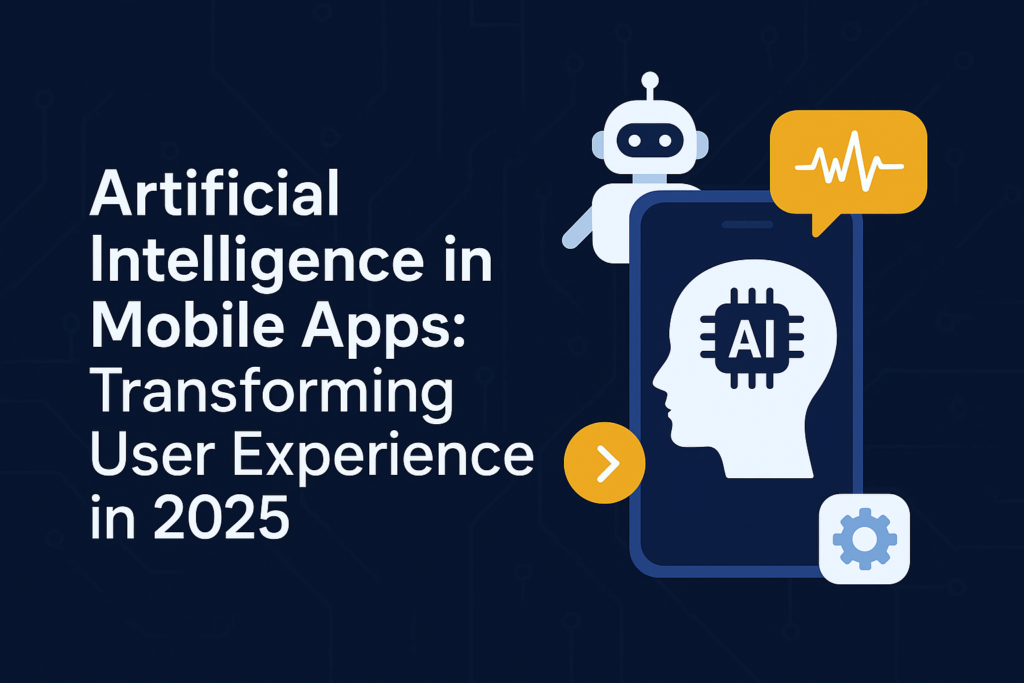Imagine opening an app that knows exactly what you need — from recommending your favorite products to predicting your next move before you even make it. This isn’t science fiction anymore. Thanks to Artificial Intelligence (AI) in mobile apps, smart, personalized, and intuitive experiences are becoming the norm.
In this blog, we’ll explore what AI in mobile apps really means, how it works, its real-world applications, challenges, future trends, and why businesses should care. Whether you are a startup founder, developer, or business owner, this guide will help you understand how AI is shaping the future of mobile app development.
What Is Artificial Intelligence in Mobile Apps?
At its core, AI in mobile apps refers to embedding machine learning algorithms and smart technologies inside applications to make them adaptive, predictive, and personalized.
Instead of simple “if this, then that” logic, AI-driven apps analyze user behavior, learn patterns, and make real-time decisions. From voice recognition and image processing to recommendation engines and chatbots, AI transforms mobile apps into powerful digital assistants.
How Does AI in Mobile Apps Work?
The process of embedding AI into mobile apps usually involves:
-
Data Collection – Apps gather user behavior data such as clicks, searches, and preferences.
-
Preprocessing – This data is cleaned and structured for analysis.
-
Model Training – Machine learning models are trained on large datasets to recognize patterns.
-
Real-Time Predictions – Once deployed, the app uses these models to predict outcomes and improve personalization.
-
Continuous Learning – The app keeps learning from new user interactions, making experiences smarter over time.
Real-World Examples of AI in Mobile Apps
AI isn’t just a buzzword. Here are some practical AI mobile app examples:
-
Virtual Assistants – Siri, Google Assistant, and Alexa use AI to understand voice commands.
-
E-commerce Apps – Amazon, eBay, and Flipkart recommend products based on user preferences.
-
Healthcare Apps – Apps track vitals, predict health risks, and provide preventive suggestions.
-
Banking & Fintech – Fraud detection, smart investment advice, and AI-powered chatbots.
-
Entertainment Apps – Netflix and Spotify suggest shows, music, and movies tailored to your taste.
-
Travel Apps – AI helps with dynamic pricing, smart itineraries, and personalized offers.
Challenges in AI-Powered Mobile App Development
While the possibilities are exciting, AI app development also comes with challenges:
-
Data Privacy Concerns – Handling sensitive user data securely.
-
High Development Costs – Training and maintaining AI models can be expensive.
-
Complexity – Building AI apps requires skilled developers and robust infrastructure.
-
Bias in AI Models – Poorly trained models may deliver inaccurate or biased results.
Future of AI in Mobile Apps (2025 and Beyond)
Here’s what’s coming next in AI mobile app development:
-
Hyper-Personalization – Apps will adapt uniquely to each user’s lifestyle and habits.
-
Emotion Recognition – Apps will detect mood through facial expressions and voice tone.
-
Augmented AI – Combination of AI with AR/VR for immersive experiences.
-
Edge AI – More apps will run AI models directly on devices (no internet needed).
-
Smarter Chatbots – Conversational AI will make customer service seamless.
Why AI in Mobile Apps Matters for Businesses
For businesses, investing in AI-driven mobile apps can:
-
Improve customer engagement with personalized recommendations.
-
Boost sales through predictive analytics.
-
Reduce costs with AI chatbots and automated workflows.
-
Increase loyalty by offering smarter, more intuitive experiences.
-
Gain a competitive edge in crowded markets.
Build AI-Powered Apps with Sodabees
At Sodabees, we specialize in building next-generation mobile applications powered by AI. Whether you need:
-
AI chatbots for customer support
-
Recommendation engines for e-commerce
-
Predictive analytics for fintech apps
-
Healthcare AI solutions
-
Voice and image recognition tools
…our team has the expertise to turn your ideas into reality.
We don’t just develop apps — we build intelligent, scalable solutions that grow with your business.
Ready to bring AI in mobile apps to your business? Schedule a free consultation with Sodabees today.
Final Thoughts
Artificial Intelligence in mobile apps is no longer optional — it’s essential. From voice recognition to predictive recommendations, AI is transforming how users interact with technology. Businesses that adopt AI today will stay ahead tomorrow.
If you’re considering AI app development, now is the time to take the leap.
Frequently Asked Questions
1. What is AI in mobile apps?
AI in mobile apps refers to integrating machine learning and smart algorithms into apps to improve personalization, automation, and decision-making.
2. How does AI improve user experience?
AI helps apps adapt to user behavior, predict needs, and provide relevant recommendations, making the experience more personalized and seamless.
3. Which industries benefit from AI mobile apps?
Industries like e-commerce, healthcare, finance, education, travel, and entertainment benefit the most from AI apps.
4. What are common AI technologies used in apps?
Natural Language Processing (NLP), Machine Learning (ML), Computer Vision, and Predictive Analytics.
5. Can startups build AI-powered apps?
Yes, with the right AI app development company like Sodabees, startups can create scalable, AI-driven apps without heavy upfront costs.


